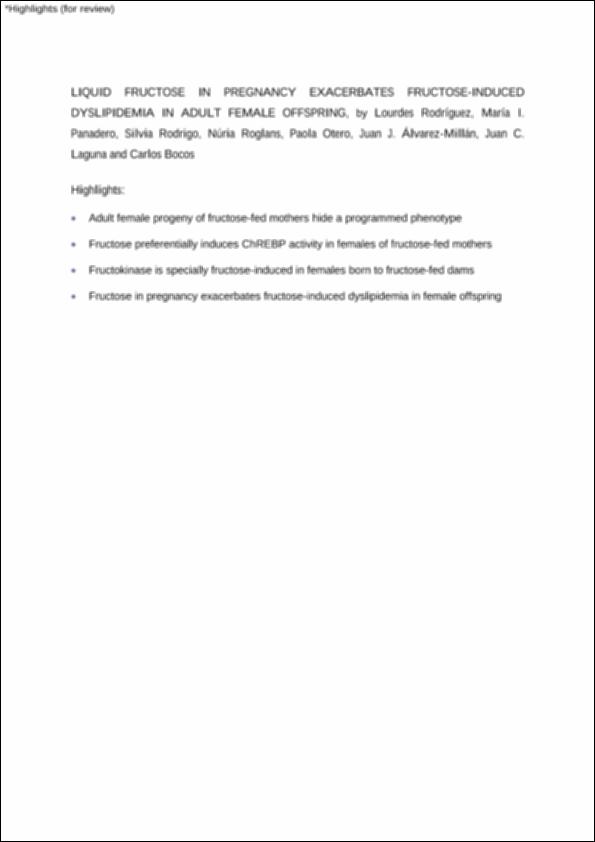Please use this identifier to cite or link to this item:
http://hdl.handle.net/10637/12938Liquid fructose in pregnancy exacerbates fructose-induced dyslipidemia in adult female offspring.
| Title: | Liquid fructose in pregnancy exacerbates fructose-induced dyslipidemia in adult female offspring. |
| Authors : | Rodríguez, Lourdes Bocos de Prada, Carlos Panadero Antón, María Isabel |
| Keywords: | Fructose pregnancy; Fetal programming; Fructokinase; Dyslipidemia |
| Abstract: | Fructose intake from added sugars correlates with the epidemic rise in metabolic syndrome and related events. Nevertheless, consumption of beverages sweetened with fructose is not regulated in gestation. Previously, we found that maternal fructose intake produces in the progeny, when fetuses, impaired leptin signalling and hepatic steatosis and then, impaired insulin signalling and hypoadiponectinemia in adult male rats. Interestingly, Adult females from fructose-fed mothers did not exhibit any of these disturbances. However, we think that, actually, these animals keep a programmed phenotype hidden. Fed 240-day-old female progeny from control, fructose- and glucose-fed mothers were subjected for 3 weeks to a fructose supplementation period (10% wt/vol in drinking water). Fructose intake provoked elevations in insulinemia and adiponectinemia in the female progeny independently of their maternal diet. In accordance, the hepatic mRNA levels of several insulin-responsive genes were similarly affected in the progeny after fructose intake. Interestingly, adult progeny of fructose-fed mothers displayed, in response to the fructose-feeding, augmented plasma triglyceride and NEFA levels and hepatic steatosis versus the other two groups. In agreement, 16 the expression and activity for carbohydrate response element binding protein (ChREBP), a lipogenic transcription factor, were higher after the fructose-period in female descendants from fructose-fed mothers than in the other groups. Furthermore, liver fructokinase expression that has been indicated as one of those responsible for the deleterious effects of fructose ingestion, was preferentially augmented in that group. Maternal fructose intake does influence the adult female offspring´s response to liquid fructose and so, exacerbates fructose induced dyslipidemia and hepatic steatosis. |
| Description: | Artículo en colaboración: María I. Panadero, Silvia Rodrigo, Núria Roglans, Paola Otero, Juan J. Álvarez-Millán, Juan C. Laguna and Carlos Bocos En: Journal of Nutritional Biochemistry. 2016. vol. 32 : 115-122 p. e-ISSN 1873-4847 |
| URI: | http://hdl.handle.net/10637/12938 |
| Rights : | http://creativecommons.org/licenses/by-nc-nd/4.0/deed.es |
| Issue Date: | 10-Aug-2016 |
| Center : | Universidad San Pablo-CEU |
| Appears in Collections: | Facultad de Farmacia |
Items in DSpace are protected by copyright, with all rights reserved, unless otherwise indicated.


